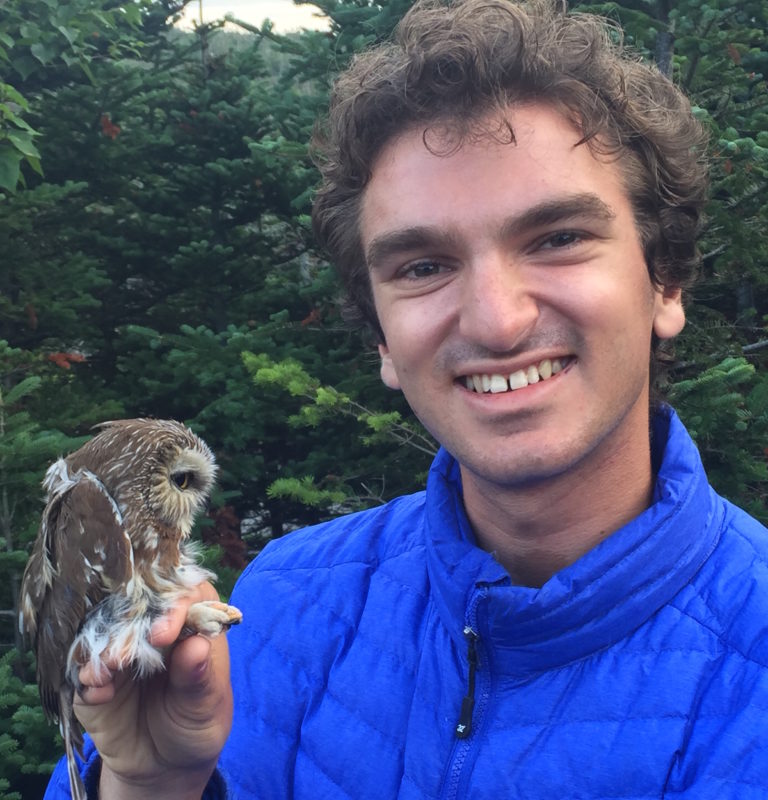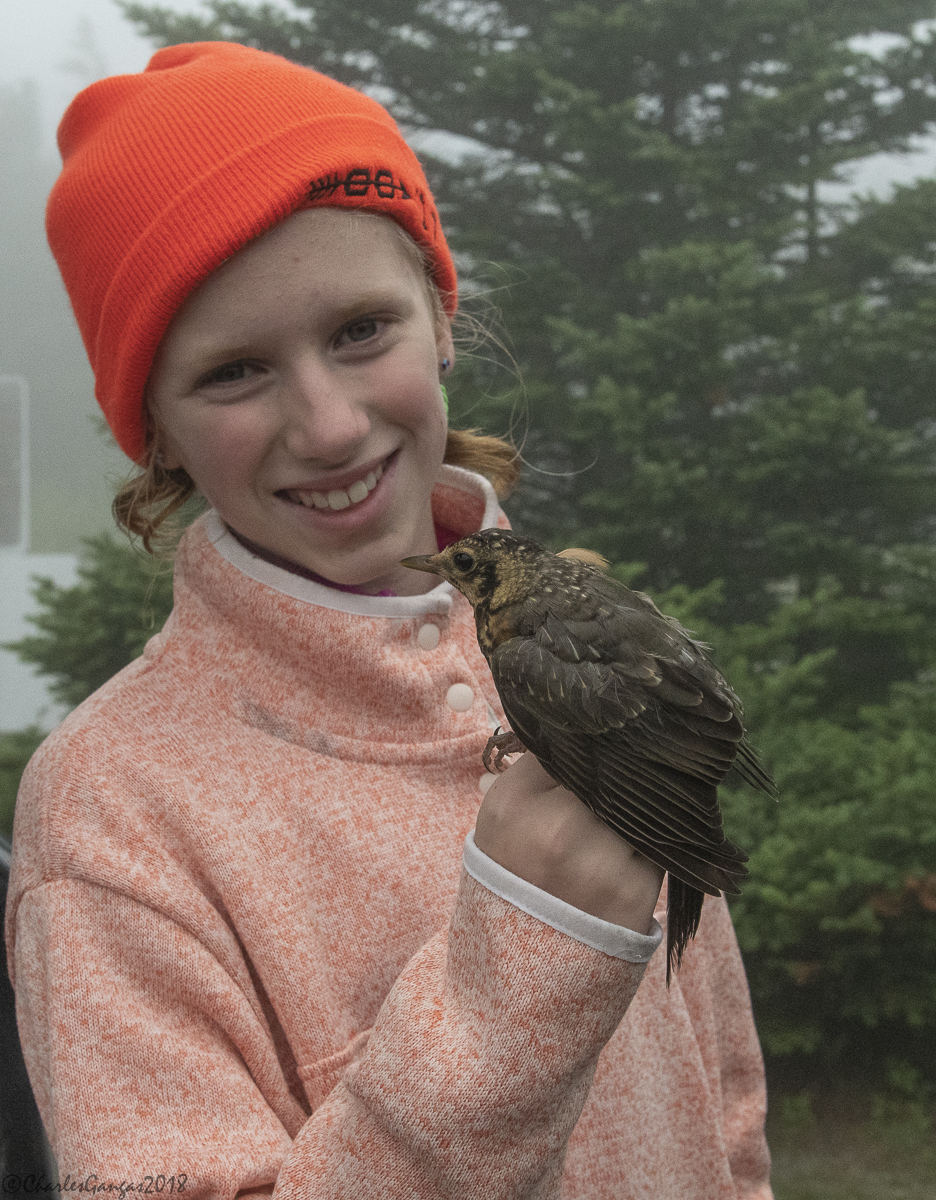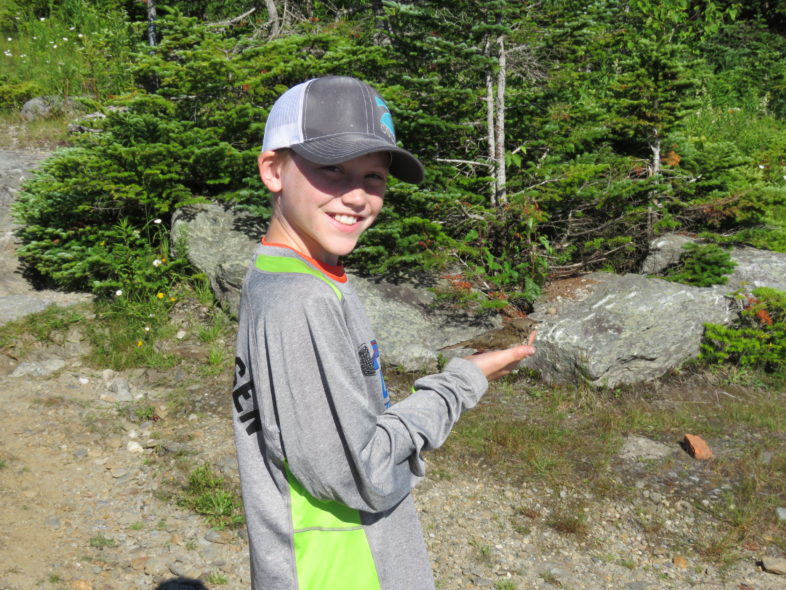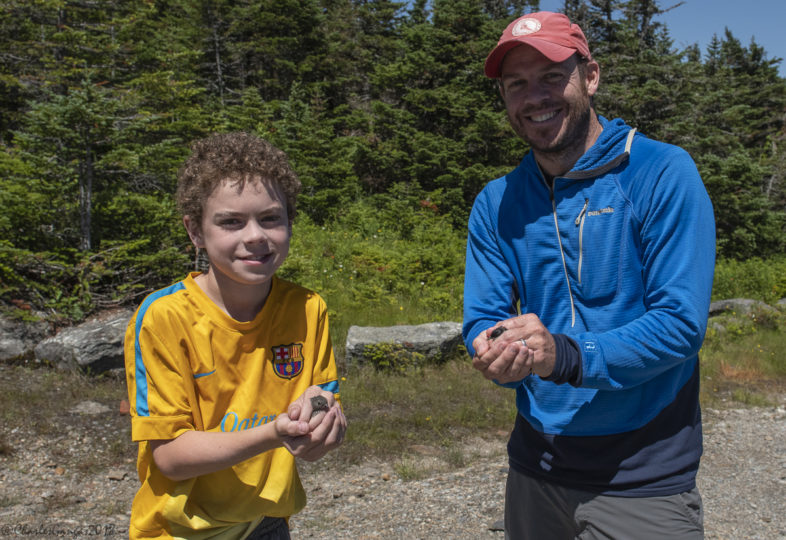By Alex Kulungian, VCE’s 2018 University of Vermont Rubenstein School Perennial Summer Intern

VCE/UVM Perennial Intern Alex Kulungian enjoys the rare opportunity to closely study a Northern Saw-whet Owl on Mount Mansfield. Photo courtesy of Mike Sargent.
Some of my most memorable experiences as the summer 2018 UVM Rubenstein School Perennial Summer Intern for VCE occurred atop Mt. Mansfield. When I began my internship in late May, I was delighted to know that I would have numerous opportunities to accompany Chris Rimmer atop Vermont’s grandest mountain to learn how to band the same feathered creatures I spent hours looking at in field guides before I’d even begun elementary school. Since early childhood, I’ve been fascinated with birds. Birds have encouraged me to spend countless hours outdoors getting to know the natural world, and they were a driving force in my decision to study wildlife biology and conservation at UVM. Participating in VCE’s bird banding research on Mt. Mansfield has been a wonderful privilege. However, one thing I’ve found very comparable to the enjoyment I feel handling birds myself is watching those same birds in the palms of VCE’s youngest bird-loving volunteers.

Brooke Hindinger carefully holds a juvenile American Robin captured in mist nets on Mt. Mansfield. Photo courtesy of Chuck Gangas.
During three of our five mid-summer bird banding excursions, VCE friends and volunteers brought their enthusiastic and eager children to Mansfield’s ridgeline for a rare treat — a chance to get up close and personal with birds in the hand. At 4 AM sharp, these young naturalists were wide awake and more than ready to assist the banding crew. They clambered with us on the rocky hiking trails, where we taught them how to operate the mist nets we use to harmlessly capture mountain-breeding songbirds. With the Sibley Guide to Birds in hand, they inspected each bird we’d collected from our nets and carefully pored over the illustrations in an attempt to identify them. As our sessions progressed, they learned to distinguish both conspicuous and subtle characteristics of each handheld bird, and began to identify some species without the help of the field guide!
What I found most meaningful, however, happened after a bird was banded and all of the necessary measurements and other data were recorded. Chris would carefully place a banded bird in the hands of an ornithologist-to-be, teaching them the correct way to release it back into its natural habitat. Witnessing this remarkable moment, I’ve learned that there is nothing quite like the glint of wonderment and awe in a child’s eyes as he or she gently cradles this tiny, feathered being. Though the interaction only lasts several seconds, I have no doubt it will stick in their memories for years to come.

A recently banded Bicknell’s Thrush pauses before launching from its comfortable perch in Ty Christensen’s palm. Photo by Liza Morse.
We may not always realize it, but interactions like these are hugely important as we consider the profound ways in which our world and environment are changing. Nowadays, I frequently hear that the future is “in the hands” of my generation. Certainly, I am part of a generation of young adults with our lives still ahead of us. While there is no doubt that our actions will play a significant role in influencing our world as we surpass the generations ahead of us, we must also consider those who are next in line just behind us. Today’s youth boast impressionable minds overflowing with imagination, curiosity, and eagerness to learn. The paths their lives take will be equally, if not more, crucial to the fate of our environment as the impacts that my own generation make. There can be nothing more important than for all generations to be made keenly aware of conservation and the vital purpose it serves.
Prior to interning at VCE, I took a UVM course called “Birding For Change,” which was unique in its similarity more to a community program than a college class. Students like me would participate in weekly visits to Flynn Elementary School in Burlington’s North End, where each of us were partnered with one child who had signed up for the after-school nature club program. As their mentors, we took them to a nearby nature preserve with the goal of helping them to experience and interact with nature. The club also provided each child with time to spend outdoors, far from the influence of electronics. More and more nowadays, kids are restricted from obtaining such experiences for various reasons. Paranoia about injury risks is one such reason. Parents fear that their children will hurt themselves by interacting so freely with nature, and thus advise them to stay out of the woods, or tell them not to touch something that caught their eye in the wild, or that climbing trees can only lead to broken legs. Such a mindset is counterproductive, as it inhibits our youth from developing intimate connections with the natural world during a time when such connections are needed more than ever. If the generation behind me is to effectively steward our vulnerable environment, young people must be exposed and inspired to take action. My VCE experience inspired me, and I look forward to paying this forward with others.

Sayre and Brendan Fisher about to release a Bicknell’s Thrush and Blackpoll Warbler, respectively. Photo courtesy of Liza Morse.

A very well written and inspirational article, Alex. I am now 70 years old, but grew up with a Mom who believed that I should be outside every chance I got. She taught me the wonders of bird and animal life starting at the age of six. This invoked a love of nature in me that has never left after all these years. I’m happy to say that I passed that onto my children and they in turn to their children. Four generations who have and will respect nature and the land as it should be. You are doing exactly the same thing, Alex, but in a much bigger way. You have the opportunity to share your skills with so many more young people coming up behind you. They, in turn, will carry on your teachings where you leave off someday. Best of luck to you in your future. You have already started to leave your mark.